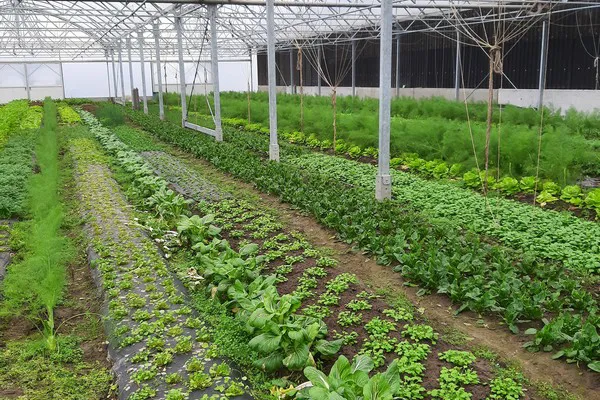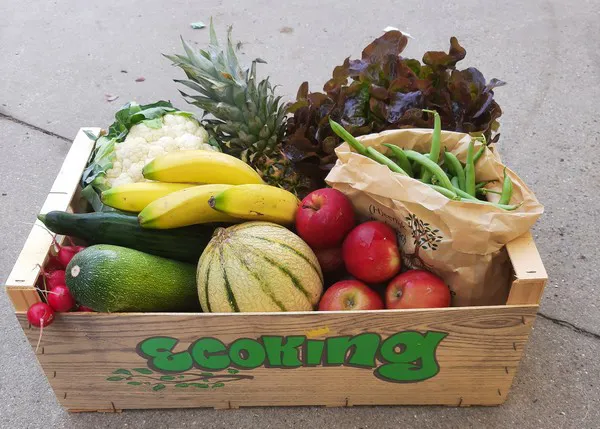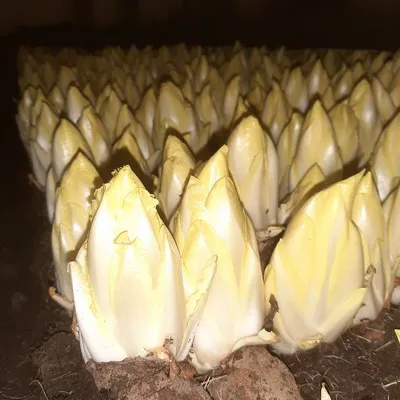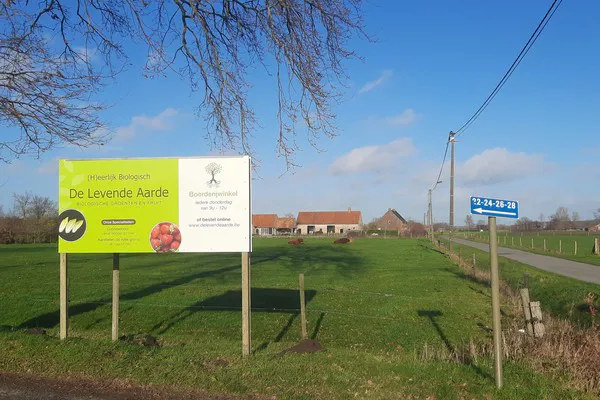Belgian farmers are struggling. "There are all kinds of new environmental and financial rules. Try and find your way through all that as a farmer. And if that's all not enough, there are issues with sales and pricing," begins Nico Vandevannet of the organic farm De Levende Aarde. He is trying to navigate these challenges.
This short-chain company has a roughly five-hectare acreage. "How it all started? By 1984, my father had gradually converted the previously mixed livestock farm into a vegetable one. First conventional products, but in 1999 he switched to organic cultivation. Like many companies at the time, he made that move after the dioxin affair."
"'There must be a way to do things differently,' he thought," explains Nico. From the beginning, the main crop consisted of open-field chicory. His father cultivated leeks and potatoes too. "These were offered from the beginning in a small farm store. We slowly added other crops, and now we have about 40 types."

A person behind the sales
When the farm was producing conventional products, most were marketed via auctions. Once it converted to organic, that was no longer possible. "Back then, the auctions didn't have an organic section, as they do now. You had to sell your produce through traders who specialized in organic products; it reverted from faceless sales to someone (growers) being behind the sales," continues Nico.
"That meant we growers were once again getting the appreciation we deserve for the hard work and passion we put into cultivating our products." Then in early 2022, the first sale through a farmers' market began. "These days, we sell at four markets and our farm store. Those are two farmers markets, a weekly market, and a stand in a (conscious) farm butcher's parking lot," says Nico.
That brought selling to wholesalers to an end, though the organic grower still supplies a trader specializing in clients who all work using the short-chain principle. "It's a system where work is done only per order. So only that which is ordered is harvested and arrives at the client/store the following day. That ensures everything is as fresh as possible and also prevents harvest surpluses. You don't have to pay brokers either, so grower margins are about five percent higher, which is nice in these times."

Pricing
Still, it remains tough to get good prices for your products, admits the grower. "Everyone agrees that our agricultural products' basic price must rise. If that doesn't happen, I think we're down to the last generation of local farmers. I was talking to a fellow grower the other day, and he stated the base price should increase by at least 30% to compensate for inflation," claims Vandevannet.

He explains that prices have remained unchanged for ten years. "Say, inflation rises by an average of two percent per annum, though that was as much as 12% in 2022."
"Then you reach 30%. So far, however, no traders will pay that. We constantly hear that food should be cheap," Nico adds.
"But that's a relic of the past when bread and games controlled everything. If you can offer cheap food, people won't revolt. The result, though, is there are almost no growers left to produce this cheap food. It's going to be tremendously challenging to keep that going."
Another issue that vexes Nico: consumers no longer know how their food is produced or where it comes from. "I recently had a buyer at the market who said, 'There's water in the chicory.' I had to try and figure out exactly what they meant. It turned out when they stewed the chicory, it released water," he says.
"That shocked them. After all, they'd bought a product that comes from the ground and weren't expecting it to contain water. I suspect they'd expected it to release soil while cooking instead. It's, thus, high time to re-educate people on how their food's produced."
Pandemic drew people to the market
When there were restrictions in place in Belgium during the pandemic, the company noticed a greatly increased influx toward short-chain businesses. "That was mainly because it was almost the only course people could take. They had quite a lot more time to cook, and it gave them something to do: visit farmers' markets or stores," Nico continues.
Though, according to him, that boom did not last after the pandemic subsided. "Now, two years later, we have about a third of the number of shoppers. Nonetheless, the amount spent per customer has risen considerably, which made up for lost revenue. Surely we can say mainly conscious clients remain."
"Remarkably, though, we get new customers every week. That's obviously nice, but retaining these new clients is hard. We serve roughly the same number of people per week, so as many drop out as come in. Everyone's trying to find the perfect way to keep these shoppers returning," Nico states.

Standing out
He notes that, these days, it is vital to stand out. "Growers and traders should do what they're good at well. Then you can distinguish yourself. Within a few years, you'll know if it was a good choice. In the past, you could make it, regardless. Nowadays, your past choices determine whether you succeed or not. For us, that's the move to organic. Those products taste authentic," Nico adds.
"We sometimes say, 'it tastes as it should'. That's what we try to work on." Soil life is, therefore, The Living Earth's mainstay. "We, for example, haven't plowed since 2009. And we feed our organic matter through a mixture of green manures. Plus, we use rock flour to boost trace elements. Adding those rock flours is like adding salt to potatoes; you can taste it," Nico concludes.
For more information:
Nico Vandevannet
De Levende Aarde
22 Breeweg
8020, Oostkamp, BE
Tel: +32 (0) 473 200 407
Email: [email protected]
Website: www.delevendeaarde.be










